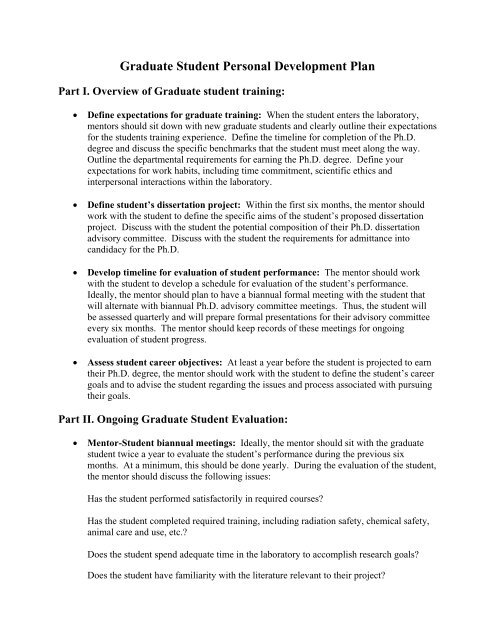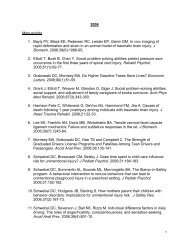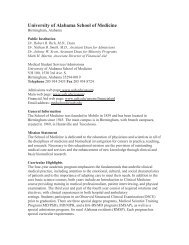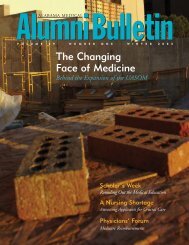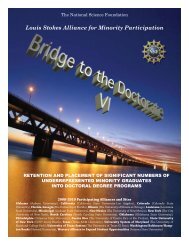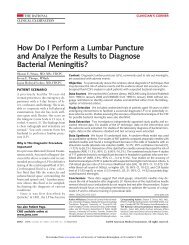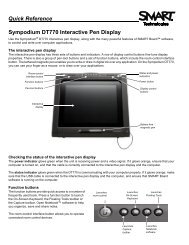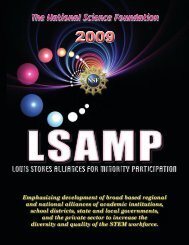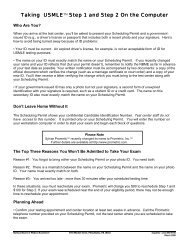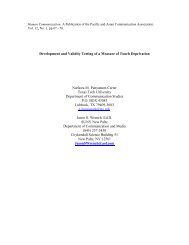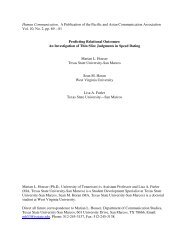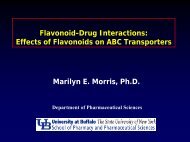Graduate Student Personal Development Plan
Graduate Student Personal Development Plan
Graduate Student Personal Development Plan
You also want an ePaper? Increase the reach of your titles
YUMPU automatically turns print PDFs into web optimized ePapers that Google loves.
<strong>Graduate</strong> <strong>Student</strong> <strong>Personal</strong> <strong>Development</strong> <strong>Plan</strong><br />
Part I. Overview of <strong>Graduate</strong> student training:<br />
• Define expectations for graduate training: When the student enters the laboratory,<br />
mentors should sit down with new graduate students and clearly outline their expectations<br />
for the students training experience. Define the timeline for completion of the Ph.D.<br />
degree and discuss the specific benchmarks that the student must meet along the way.<br />
Outline the departmental requirements for earning the Ph.D. degree. Define your<br />
expectations for work habits, including time commitment, scientific ethics and<br />
interpersonal interactions within the laboratory.<br />
• Define student’s dissertation project: Within the first six months, the mentor should<br />
work with the student to define the specific aims of the student’s proposed dissertation<br />
project. Discuss with the student the potential composition of their Ph.D. dissertation<br />
advisory committee. Discuss with the student the requirements for admittance into<br />
candidacy for the Ph.D.<br />
• Develop timeline for evaluation of student performance: The mentor should work<br />
with the student to develop a schedule for evaluation of the student’s performance.<br />
Ideally, the mentor should plan to have a biannual formal meeting with the student that<br />
will alternate with biannual Ph.D. advisory committee meetings. Thus, the student will<br />
be assessed quarterly and will prepare formal presentations for their advisory committee<br />
every six months. The mentor should keep records of these meetings for ongoing<br />
evaluation of student progress.<br />
• Assess student career objectives: At least a year before the student is projected to earn<br />
their Ph.D. degree, the mentor should work with the student to define the student’s career<br />
goals and to advise the student regarding the issues and process associated with pursuing<br />
their goals.<br />
Part II. Ongoing <strong>Graduate</strong> <strong>Student</strong> Evaluation:<br />
• Mentor-<strong>Student</strong> biannual meetings: Ideally, the mentor should sit with the graduate<br />
student twice a year to evaluate the student’s performance during the previous six<br />
months. At a minimum, this should be done yearly. During the evaluation of the student,<br />
the mentor should discuss the following issues:<br />
Has the student performed satisfactorily in required courses?<br />
Has the student completed required training, including radiation safety, chemical safety,<br />
animal care and use, etc.?<br />
Does the student spend adequate time in the laboratory to accomplish research goals?<br />
Does the student have familiarity with the literature relevant to their project?
Does the student understand laboratory problems, procedures, and equipment?<br />
Does the student perform laboratory skills with a reasonable level of proficiency?<br />
Does the student design experiments with adequate controls?<br />
Does the student plan a series of experiments logically?<br />
Does the student keep adequate laboratory records?<br />
Does the student exhibit the ability to evaluate experimental results?<br />
Does the student exhibit receptiveness to suggestions and critical comments?<br />
Does the student exhibit the capacity for self-expression and communication?<br />
Does the student exhibit the ability to get along with co-workers?<br />
• Ph.D. advisory committee meetings: Within the first six months of the date that the<br />
student enters the laboratory, it is advisable to hold a preliminary advisory committee<br />
meeting. Many graduate programs do not require this, but it will often be extremely<br />
beneficial to the student in terms of helping them begin to focus on their dissertation<br />
project. Ideally, the mentor should encourage the student to hold biannual dissertation<br />
advisory committee meetings to review the student’s progress. At these meetings, the<br />
student should prepare a formal update concerning their project and recent progress<br />
during the past six months. The committee should evaluate the student’s progress in<br />
terms of the original specific aims and should provide scientific advice if changes to the<br />
original goals need to be made. The advisory committee should be asked to evaluate the<br />
overall progress of the student with respect to the projected time to graduation for that<br />
student. Specific recommendations should be provided to the student at the conclusion of<br />
the meeting concerning scientific direction and experimental goals for the next six<br />
months.<br />
Part III. Completion of the Ph.D.:<br />
• Evaluation of student achievements: The mentor and student should discuss student<br />
achievements including papers published, abstracts published, presentations at meetings,<br />
research competitions, etc. The mentor should assist the student in the preparation of a<br />
CV early in the program and encourage the student to regularly update their CV.<br />
• Assesment of career goals: The mentor and student should discuss the intermediate and<br />
long-term goals of the student and the mentor should advise the student on the necessary<br />
steps to achieve their intermediate career goal (e.g. postdoctoral fellow position). The<br />
mentor should begin this process early in the student’s training to ensure that sufficient<br />
time is allotted for planning and preparation on the part of the student so that they can<br />
meet requirements in order to be competitive.
• Completion of Ph.D. degree: The mentor and student should meet one year to six<br />
months prior to graduation to ensure that the student has completed all requirements of<br />
the departmental graduate program. The mentor and student should discuss the steps<br />
involved in preparing the dissertation and completing both the private and public final<br />
defense.


